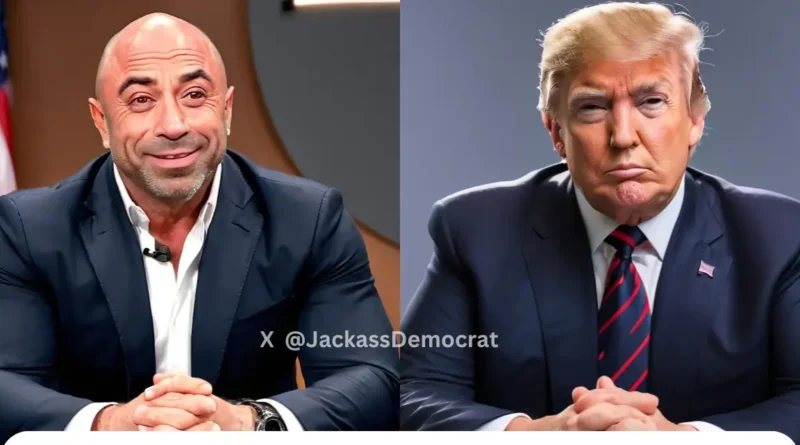Why Rogan’s Trump Interview Shook Social Media
Why Rogan’s Trump Interview Shook Social Media. The recent podcast where Joe Rogan interviewed former President Donald Trump has exploded into a massive news event, dominating headlines and sparking debates across social media. This event, which brought together two of America’s most controversial and influential figures, has triggered intense reactions on both sides of the political spectrum.
On one hand, right-leaning media outlets and many Americans praised the unfiltered, unscripted format, which they felt provided a refreshing departure from traditional media interviews. On the other hand, left-leaning mainstream media (MSM) has responded with a wave of negative coverage, criticizing both the platform and the substance of the conversation. This clash between the two reactions highlights not just the polarization of American politics, but also deeper issues around media trust, authenticity, and the power of social media.
Table of Contents
Why the Event Went Viral on Social Media
The significance of this podcast episode begins with the magnitude of its two participants. Joe Rogan, host of “The Joe Rogan Experience,” is the most listened-to podcaster in the world, with millions of downloads per episode. His audience spans political, ideological, and demographic divides, with many tuning in specifically because of his long-form, casual interview style that contrasts sharply with traditional mainstream media formats. Donald Trump, meanwhile, remains one of the most polarizing figures in American history, even years after his presidency. The combination of Rogan’s platform and Trump’s notoriety guaranteed that the episode would become a major media event.
Social media’s role in amplifying the impact of the podcast cannot be overstated. Platforms like Twitter (now X), Facebook, and TikTok allow snippets of the interview to go viral, condensing long discussions into meme-worthy soundbites. Many Americans who might not have the time to listen to the entire podcast can quickly engage with these clips, creating echo chambers where opinions—both positive and negative—are reinforced. Memes, quotes, and out-of-context remarks further stir the pot, keeping the conversation alive for days or weeks, rather than just fading after the initial release. This viral spread highlights the growing power of alternative media platforms like Rogan’s, which can challenge the dominance of traditional outlets in shaping public discourse.
Left-Leaning MSM’s Negative Reaction: Fear of Normalizing Trump?
One of the reasons the left-leaning mainstream media has been so critical of the podcast stems from concerns over how it presents Donald Trump to the public. During his presidency, and especially after the January 6th Capitol riot, many left-leaning outlets, such as CNN, MSNBC, and The New York Times, have portrayed Trump as a danger to American democracy. For them, any platform that allows him to speak freely without bogus fact-checking from left leaning sources risks them losing control of the message.
The Rogan interview, by its very nature, was informal and unrehearsed. Rogan does not typically challenge his guests aggressively or cut them off when they express controversial viewpoints. This style is a double-edged sword: while it allows guests to speak more candidly, it also leads to criticism that Rogan is not holding them accountable. For many on the left, Trump’s appearance on a relaxed, conversational podcast—without the rude interruptions of leftist propagandist hosts on MSM outlets — actions typical of traditional media— allows President Trump to actually explain his policies. Critics argue that this kind of platform gives Trump a way to get his message to the people without biased interjections from leftist hosts.
Moreover, Trump’s charisma and ability to connect with a significant portion of the American electorate are well-documented. The concern among left-leaning media is that an unfiltered Trump could once again capture the hearts of his supporters and sway undecided voters, especially if they feel that the MSM has treated him unfairly. In this sense, the negative reaction from left-leaning outlets is not just about the interview itself, but about the broader impact it could have on the political landscape—particularly with the 2024 election looming.
Criticism of Rogan’s Role as an Interviewer
In addition to the focus on Trump, the left-leaning MSM has also taken aim at Joe Rogan’s approach to the interview. Rogan is known for letting his guests speak at length, often without interruption, which can create the impression that he is endorsing their views, even when he isn’t. The left-wing criticism centers on the idea that Rogan, by not rudely interrupting President Trump, allows the people to actually hear what he has to say. The left wants to censor and control what the people see or hear. it’s all about censorship and control of the public square.
This feeds into a broader critique of Rogan’s podcast. Over the past few years, Rogan has been accused of spreading misinformation or providing a platform for controversial figures who espouse fringe ideas. Anything the left disagrees with they tag as misinformation. While his defenders argue that Rogan is simply committed to free speech and long-form conversations, his detractors believe that this “both sides” approach can be dangerous when dealing with politically sensitive topics. Rogan’s casual, unfiltered style works for some, but for others, they don’t have the skill to interview people in the same way.
Why Many Americans Love the Unrehearsed Format
For many Americans, however, it’s precisely Rogan’s unpolished and unscripted style that makes his podcast so appealing. In an age of media distrust, where large portions of the population believe that mainstream outlets are biased or agenda-driven, Joe Rogan represents an alternative. His interviews feel more authentic, less constrained by corporate interests, and more in tune with everyday conversation. Many listeners appreciate the way Rogan approaches topics with curiosity rather than preconceptions, allowing his guests to speak openly rather than sticking to talking points.
This authenticity resonates particularly with Americans who are tired of the hyper-partisan nature of traditional leftist MSM. The left-leaning MSM often engages in adversarial interviews with conservative figures, which can feel combative and leave little room for nuance. In contrast, Rogan’s style—where the guest is free to speak at length—creates an impression of fairness and allows listeners to form their own opinions. Even though this means controversial ideas that the left disagrees with may go unchallenged, for many Americans, it’s a refreshing departure from what they see as a media landscape dominated by dishonest left leaning hosts.
Additionally, Trump himself thrives in this kind of format. Love him or hate him, Trump is a media-savvy figure who knows how to work an audience. His ability to connect with his base stems from his conversational, almost improvisational style, which plays perfectly in a podcast setting. Rather than being constrained by the formalities of a news studio, Trump is able to project the same kind of off-the-cuff authenticity that made him such a polarizing, yet magnetic figure during his time in office. For his supporters, this is precisely why they tuned in to the podcast: to hear Trump speak freely, without the filters of mainstream news.
Why Rogan’s Trump Interview Shook Social Media
The Broader Significance of the Event
The enormous reaction to the Rogan-Trump interview is emblematic of the media landscape in 2024, where podcasts, Rumble.com channels, YouTube channels, and independent content creators are increasingly shaping political discourse. Traditional news outlets no longer have a monopoly on the narrative, and figures like Rogan represent a new type of media power—one that is less formal, more engaging, and often more trusted by a significant portion of the population. The left-leaning MSM’s negative response to the podcast reveals a deeper anxiety about this shift. They no longer control the platform on which major political figures like Trump can present themselves to the public.
This episode has also reignited debates about free speech, media accountability, and the role of alternative platforms in shaping democracy. For some, Rogan’s platform represents a necessary counterbalance to the gatekeeping of traditional media, while for others, it’s a dangerous avenue for the spread of ideas or views the left disagrees with. Ultimately, the explosive reaction to the Rogan-Trump podcast underscores the deep divisions in American society—divisions not just over political figures like Trump, but over who controls the narrative and what it means to have an informed electorate.
In the end, the interview’s viral success is a testament to the changing nature of media and politics. The fact that millions of people turned to a podcast, rather than a TV network, to hear a former president speak suggests a seismic shift in where Americans get their information. It also highlights the tensions between old and new media, as traditional outlets struggle to maintain their influence in a world where podcasts and social media increasingly dominate. The democrat party is running scared as their propaganda outlets of the MSM are losing their control over what people see or hear and that threatens their control over the public.




